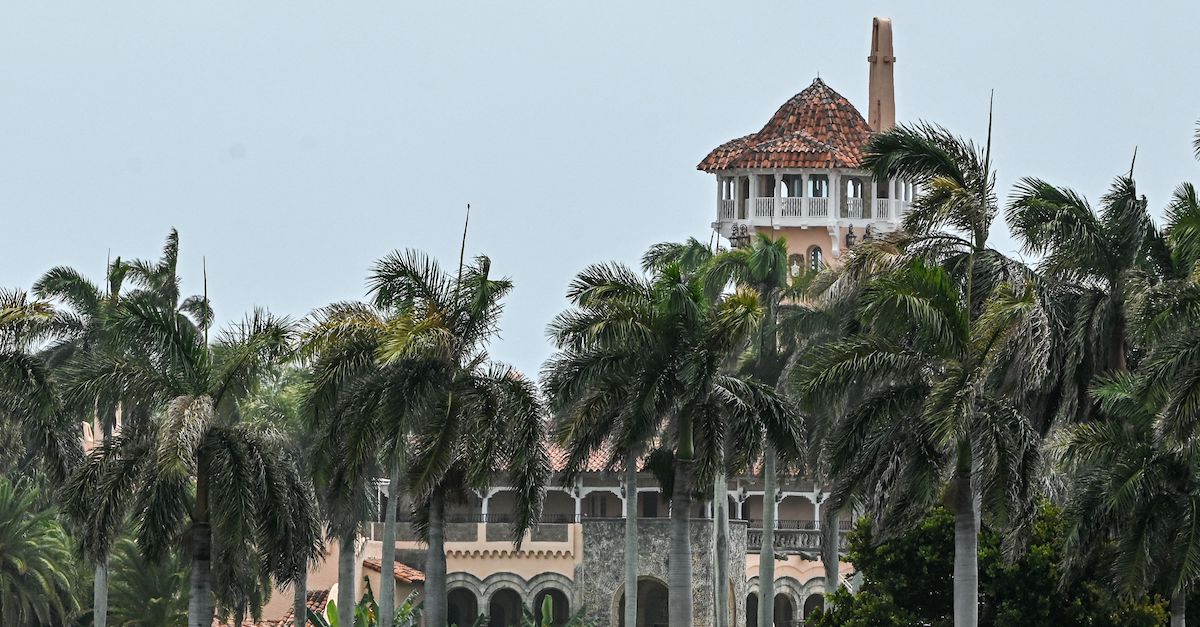
The residence of former US President Donald Trump at Mar-A-Lago in Palm Beach, Florida, on Aug. 9, 2022.
Listen to the full episode on Apple, Spotify or wherever else you get your podcasts, and subscribe.
If federal prosecutors were to pursue charges against Donald Trump because of his handling of classified information, a top national security lawyer believes the former president would face an uphill battle at any trial.
“It would be a very complicated piece of litigation only because Trump would try to bog it down in pretrial motions, no doubt,” attorney Bradley Moss noted on Law&Crime’s podcast Objections: with Adam Klasfeld. “But if a charge is brought — if the information is as we believe it is, at this point — I don’t foresee a way he would avoid conviction.”
On Monday, Trump confirmed that the FBI “raided” his home and even searched his safe in Mar-a-Lago, pursuant to a court-authorized search warrant. The affidavit stating the probable cause for the search has not yet become public, but several reports have suggested that it relates to Trump’s handling of classified information after his presidency.
Moss, a leading expert on classification matters, long predicted Trump’s potential criminal exposure earlier this year, following reports that the National Archives sought the return of 15 boxes of materials. Those reportedly included Trump’s so-called “love letters” with North Korean dictator Kim Jong Un, a letter that Barack Obama left for him, and the map of Hurricane Dorian’s path that Trump altered with black magic marker.
Even based on previously reported information, Moss said, Trump could be in trouble.
“I certainly think that correspondence would have been classified,” Moss noted, referring to the Kim Jong Un letters. “That’s foreign government information.”
Citing several other developments, Moss believes that there may be other information at issue that has not been publicly reported. He noted that the FBI met with Trump’s attorneys in June, and federal authorities interviewed Trump aides at the resort in April and May.
That leads Moss to suspect the investigation goes beyond the 15 boxes.
“I would be surprised if it’s only those kinds of records that we’re talking about,” Moss said. “I have a feeling you’re going to find far more sensitive documentation, the kind of stuff that a president would need to keep up to date on in his residence for intelligence briefings and things along those lines.”
Though nobody has seen the affidavit supporting the FBI’s search, Moss suspects that it would most likely list two subparagraphs 18 U.S.C. 793, governing the gathering, transmission or loss of defense information.
Those provisions, paragraphs “d” and “f,” “deal with someone who originally had authorized access to information, who then either willingly transmit or transports the information to an unsecured place or location, who is grossly negligent in the handling of the information and and allowing it to be put in an unsecured location, or learns that the information and documentation has been transported to an unsecure location and does nothing to rectify it,” Moss said.
They also carry the potential for serious prison time, and though lighter statutes like Section 2071 might be in play, Moss finds them unlikely to be the ones scrutinized by the Justice Department unless prosecutors want to throw in the “kitchen sink.”
If those statutes were the primary ones supporting the search, Moss said: “It would have been a civil matter.”
When he was president, Trump had the power to declassify anything that he chose, but Moss noted that this authority lapsed the moment he left his office.
“The reason this is happening is because there were classified documents that were found at Mar-a-Lago, and once Donald Trump became a private citizen, again, he no longer had any authority to retain or hold on to properly marked unclassified documents anywhere outside of a government facility,” Moss noted. “That’s why he’s in trouble.”
In the interview, Moss explains what the search required prosecutors to demonstrate, how high up he believes the sign-off on the raid likely went, and what federal authorities might do with information they may have found in the former president’s safe and home.
Listen to the podcast, below:
(Photo of Mar-a-Lago by GIORGIO VIERA/AFP via Getty Images)
Have a tip we should know? [email protected]